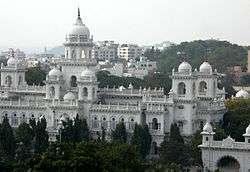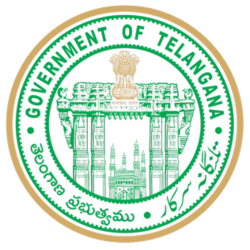Government of Telangana
Government of Telangana (Telugu: తెలంగాణ ప్రభుత్వము), is a democratically elected body that governs the State of Telangana, India. The state government is headed by the Governor of Telangana as the nominal head of state, with a democratically elected Chief Minister as real head of the executive. The governor who is appointed for five years appoints the chief minister and his council of ministers. Even though the governor remains the ceremonial head of the state, the day-to-day running of the government is taken care of by the chief minister and his council of ministers in whom a great deal of legislative powers is vested. The state government maintains its capital at Hyderabad and is seated at the Government Secretariat or the Sachivalayam.
The Government of Telangana was formed on 2 June 2014 after bifurication of Andhra Pradesh as part of Andhra Pradesh Reorganisation Act, 2014.
Government and Administration
Structure
The Governor is the constitutional head and the Chief Minister is head of the government who also heads the council of ministers.The Chief Justice of the high court is the head of the judiciary.
Governor
The Governor is appointed by the President for a term of five years. The executive and legislative powers lie with the Chief Minister and his council of ministers, who are appointed by the Governor. The Governors of the states and territories of India have similar powers and functions at the state level as that of the President of India at Union level. Only Indian citizens above 35 years of age are eligible for appointment. Governors discharge all constitutional functions such as the appointment of the Chief Minister, sending reports to the President about failure of constitutional machinery in a state, or with respect to issues relating to the assent to a bill passed by legislature, exercise or their own opinion.[3]
Ekkadu Srinivasan Lakshmi Narasimhan has been the present governor since 2 June 2014. The Governor enjoys many different types of powers:
- Executive powers related to administration, appointments and removals.
- Legislative powers related to lawmaking and the state legislature.
- Discretionary powers to be carried out according to the discretion of the Governor.
Legislature

The legislature comprises the governor and the legislative assembly, which is the highest political organ in state. The governor has the power to summon the assembly or to close the same. All members of the legislative assembly are directly elected, normally once in every five years by the eligible voters who are above 18 years of age.
The current assembly consists of 119 elected members and one member nominated by the governor from the Anglo-Indian Community. The elected members select one of its own members as its chairman who is called the speaker. The speaker is assisted by the deputy speaker who is also elected by the members. The conduct of meeting in the house is the responsibility of the Speaker.
The main function of the assembly is to pass laws and rules. Every bill passed by the house has to be finally approved by the governor before it becomes applicable.
The normal term of the legislative assembly is five years from the date appointed for its first meeting. But while a proclamation of state of emergency is in operation, the said period will be extended by Parliament by Laws for a period not exceeding one year at a time
Judiciary
The High Court of Judicature at Hyderabad is the apex court for the state .It is a court of record and has all the powers of such a court including the authority to punish an individual for contempt of court. Like all other High Courts of India, this court also consists of a Chief Justice and other judges who are appointed by the President of India. Every judge including the Chief Justice is appointed by the President of India by Warrant under his hand and seal. Every permanent and additional judge will continue in office until the age of 62
The High Court of Telangana is located in Hyderabad, Telangana and there are courts in every district centers and some municipal centers.
Executive
Like in other Indian states, the Executive arm of the state is responsible for the day-to-day management of the state. It consists of the Governor, the Chief Minister and the Council of Ministers.
The secretariat headed by the secretary to the governor assists the council of ministers. The council of ministers consists of cabinet ministers, ministers of state and deputy ministers. The chief minister is assisted by the chief secretary, who is the head of the administrative services.
Chief Minister
The executive authority is headed by the Chief Minister of Telangana, who is the de facto head of state and is vested with most of the executive powers; the Legislative Assembly's majority party leader is appointed to this position by the Governor. The present Chief Minister is Kalvakuntla Chandrashekar Rao, who took office on 2 June 2014.[4] Generally, the party which reaches more than half mark i.e. 60 seats out of 119 decides the Chief Minister.
Council of Ministers
The Council of Ministers, which answers to the Legislative Assembly, has its members appointed by the Governor; the appointments receive input from the Chief Minister. They are collectively responsible to the legislative assembly of the State. Generally, the winning party and its chief minister chooses the ministers list and submit the list for the Governor's approval.
Administrative divisions
Telangana State has been divided into 10 districts. The business of the state government is transacted through the various secretariat departments based on the rules of business. Each department consists of secretary to government, who is the official head of the department and such other under secretaries, junior secretaries, officers and staffs subordinate to him/her. The Chief secretary superintending control over the whole secretariat and staff attached to the ministers.
Elections
| This article is part of a series on |
| Government and Politics of Telangana |
|---|
|
State of Telangana తెలంగాణ రాష్ట్రము |
|
Elections
|
|
Local Government
|
Elections to the state assembly are held every five years. Elections are generally held for Parliament, State assembly and regional panchayats. Like all other Indian states, the minimum age of registration of a voter is 18 years.
References
- ↑ ANDHRA PRADESH LEGISLATIVE COUNCIL. legislativebodiesinindia.nic.in
- ↑ state legislature. Legislativebodiesinindia.nic.in. Retrieved on 2012-01-09.
- ↑ "The States". Government of India.
- ↑ "TRS wins in Telangana". Deccan-Journal. Retrieved 27 May 2014.
| ||||||||||||||||||||||||||||||||||||||
| ||||||||||||||


